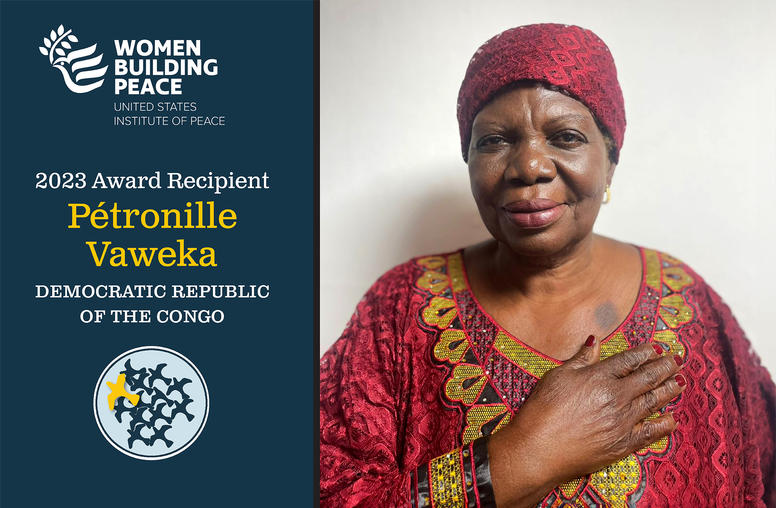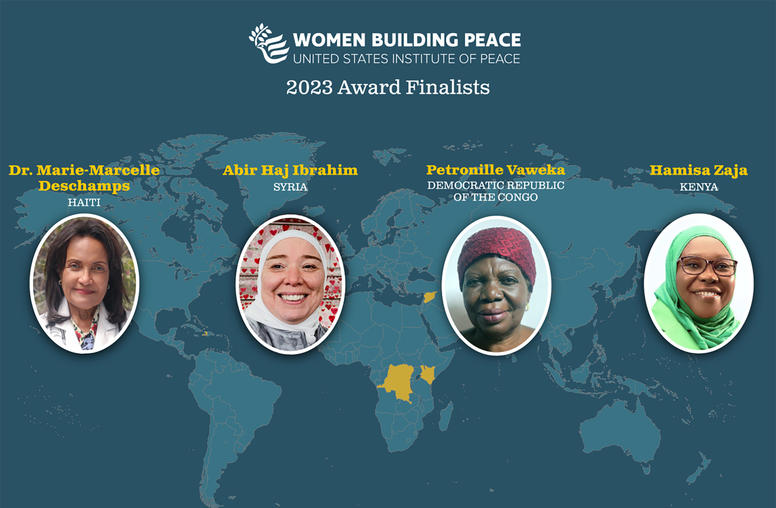New Beginnings
Institute welcomes a new Grant Program director and unveils new Religion and Peacemaking Initiative.
WASHINGTON, D.C. -- The United States Institute of Peace is pleased to announce that Dr. Judy Barsalou of Arlington, Virginia will assume the directorship of its Grant Program. She replaces Dr. David Smock, who has become the director of a new program at the Institute on religion and peacemaking.
 Dr. Barsalou holds a Ph.D. and MA from Columbia University in comparative politics and international relations. She previously worked for the Ford Foundation in Cairo, Egypt; the University of California at Davis; the Middle East Research and Information Project; and the Center for Policy Analysis on Palestine. Her experience includes administration of grants and projects in the Middle East, Africa, and the United States
Dr. Barsalou holds a Ph.D. and MA from Columbia University in comparative politics and international relations. She previously worked for the Ford Foundation in Cairo, Egypt; the University of California at Davis; the Middle East Research and Information Project; and the Center for Policy Analysis on Palestine. Her experience includes administration of grants and projects in the Middle East, Africa, and the United States
"The Grant Program is central component of the Institute's efforts to fulfill its congressional mandate. It has long been the linchpin of the Institute's outreach to the private sector world of university and think tank research and NGO programming. It is helping to build the knowledge base for new approaches to international peacemaking," said Dr. Richard H. Solomon, the Institute's president. "Dr. Barsalou promises to give the Institute outstanding leadership of our grantmaking activities. She will no doubt continue our productive relationship with the research and policy communities and add her own imprimatur to the direction of the Institute's intellectual activities."
The Grant Program was established as the first of the Institute's eight programs. Since its creation in 1986, the program has awarded 1,252 grants totaling $38,579,732. Through its two principal grantmaking components -- unsolicited grants and solicited grants -- the Institute offers financial support for research, education, training, and the dissemination of information on international peace and conflict resolution. All grants contribute to policy-relevant analysis by identifying and funding top specialists who are working in areas that fall within the Institute's broad mandate.
Smock To Direct New Religion and Peacemaking Program
 Dr. David R. Smock has been appointed director of the Institute's new Religion and Peacemaking Program. Smock will work with religious communities in the United States to facilitate their contributions to the management of international conflicts. He formerly served as director of the Institute's Grant Program.
Dr. David R. Smock has been appointed director of the Institute's new Religion and Peacemaking Program. Smock will work with religious communities in the United States to facilitate their contributions to the management of international conflicts. He formerly served as director of the Institute's Grant Program.
The Religion and Peacemaking Program -- which replaces and builds on the Religion, Ethics, and Human Rights Initiative -- will organize workshops for religious leaders in the United States on international conflict and provide training in international conflict management and resolution skills. The program also will help religious communities map out their program strategies for peacemaking, and will publish research on conflict management and peacemaking issues to help religious bodies with their work in those areas.
In addition to his position as grant director, Smock has worked on African issues for over 30 years and served as coordinator of Africa activities at the Institute. He will continue to consult with the Institute's Research and Studies Program on Africa issues.
At the Ford Foundation in 1964-80, Smock worked in Nigeria, Ghana, Kenya, and Lebanon, as well as in New York. In 1980-86, he served concurrently as director of the South African Education Program, a scholarship program that brings black South African students to U.S. universities, and vice president for program development and research for the Institute of International Education.
After a tenure as executive associate to the president of the United Church of Christ in 1986-89, he became executive director of International Voluntary Services, supervising development projects in Africa, Asia, and Latin America.
Smock is editor of Making War and Waging Peace: Foreign Intervention in Africa (1993), co-editor of African Conflict Resolution: The U.S. Role in Peacemaking (1995), and author of Religious Perspectives on War (1992), Perspectives on Pacifism (1995), and several other books on Africa. He received a Ph.D. in anthropology from Cornell University and an M. Div. from New York Theological Seminary. He is an ordained minister of the United Church of Christ.
The U.S. Institute of Peace is a non-partisan, independent organization created and funded by the U.S. Congress to promote prevention and resolution of international conflicts. Established in 1984, the Institute has its origins in the tradition of American statesmanship that seeks to limit international violence and to achieve peace based upon freedom, justice, and human dignity.

